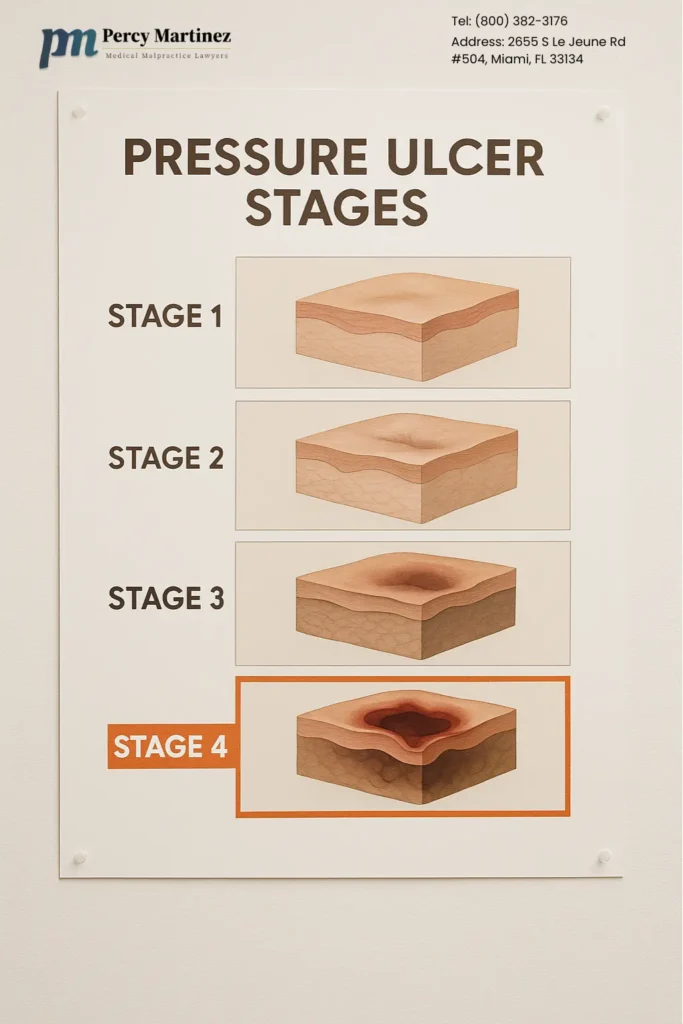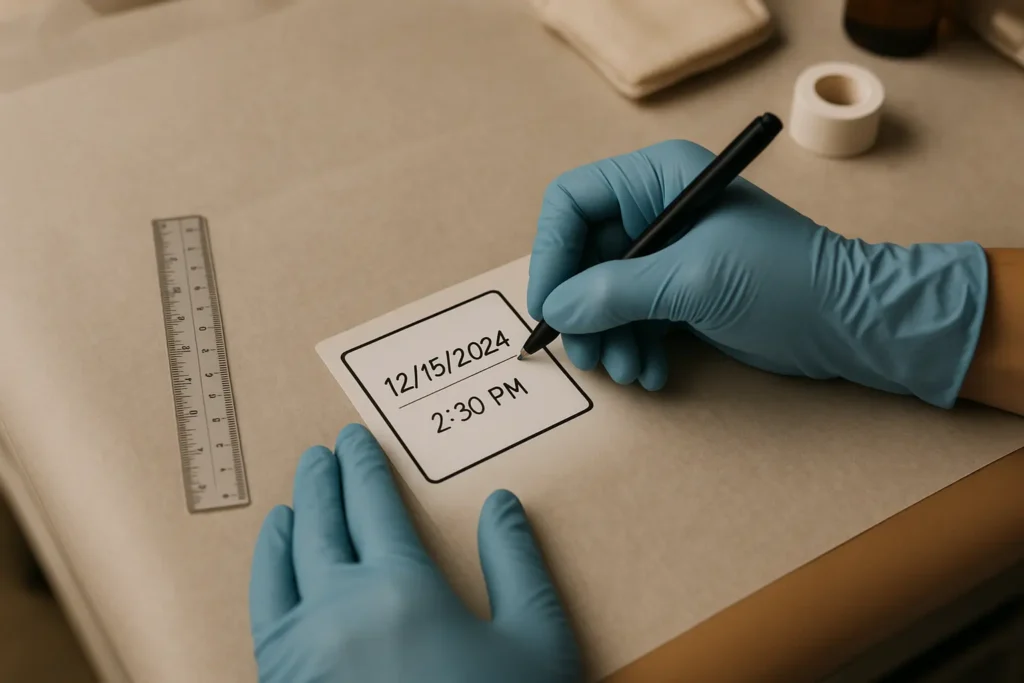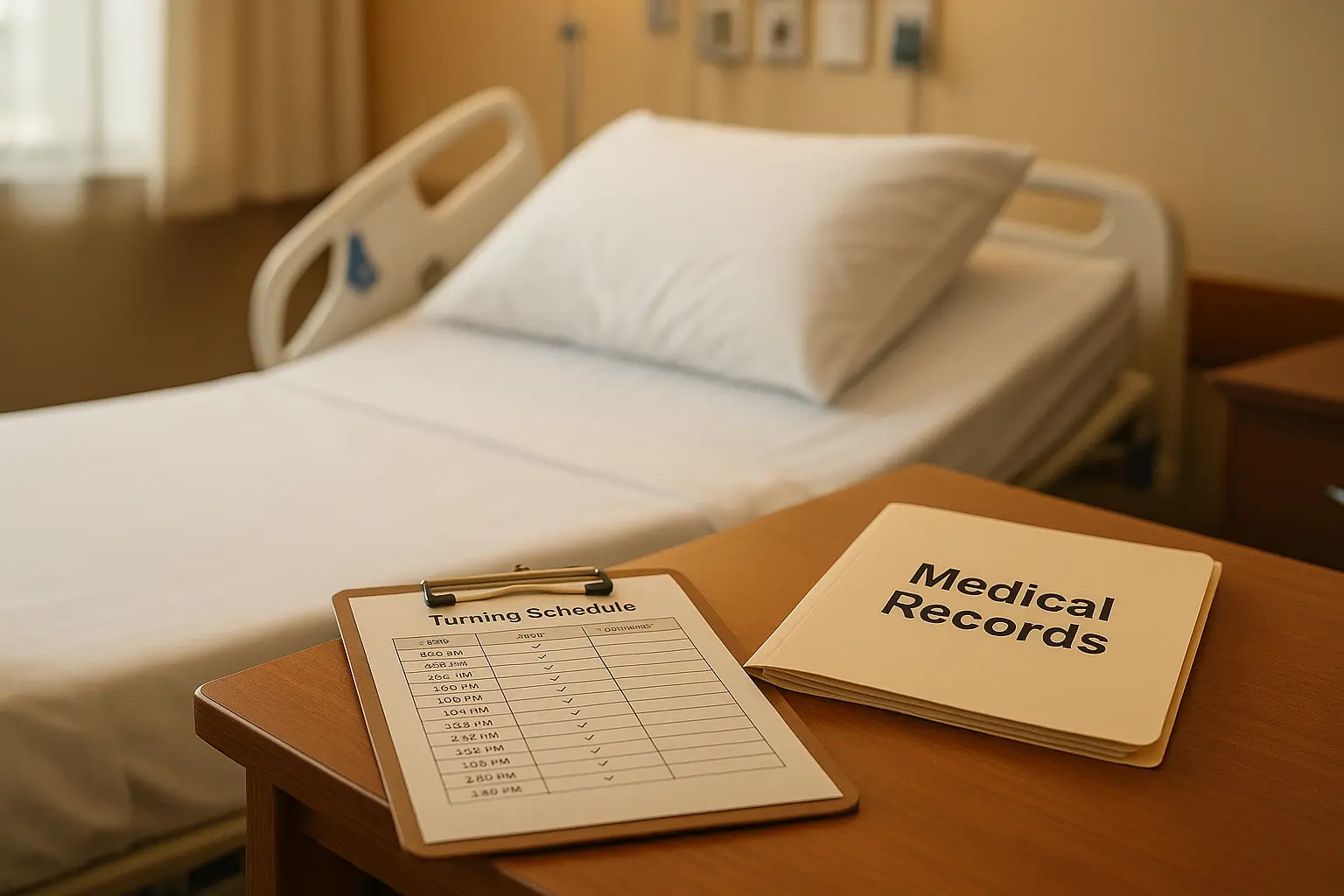Note: This page is education only. If your loved one is in immediate danger, call 911.
Stage 4 pressure ulcers are deep wounds that can expose muscle, tendon, or bone and carry a serious risk of infection. If your loved one developed one in a facility in Florida, you need clear steps for medical care, documentation, and legal options in Florida. Percy Martinez and our legal team guide families daily through this exact situation in Miami, Fort Lauderdale, West Palm Beach, Orlando, Tampa, and Jacksonville.
Table of Contents
What is a Stage 4 bedsore
A Stage 4 pressure ulcer means full thickness loss of skin and tissue with exposed or directly palpable fascia, muscle, tendon, ligament, cartilage, or bone. These wounds often include undermining or tunneling and commonly form over bony areas such as the sacrum and heels. Accurate staging matters because it drives treatment and signals the level of risk. Families often hear different terms for the same injury, including bedsore, pressure sore, decubitus ulcer, and pressure injury. Use the term pressure injury in your notes and ask the facility to state the stage in every wound entry.

Why Stage 4 can signal neglect
Most Stage 4 wounds are preventable with basic systems of care that include frequent repositioning, offloading of heels and sacrum, moisture and incontinence management, nutrition support, and device checks for tubing or braces that press on skin. Hospital and nursing guidelines emphasize posted turning schedules, one to two hour repositioning for those at risk, heel elevation, and daily skin checks. If the facility documents a change, it must adjust the care plan and monitor response. When a Stage 4 appears or worsens without timely assessment, specialty consult, or escalation, that gap often supports a neglect claim. At the same time, federal guidance recognizes a narrow category of unavoidable injuries when a facility proves it evaluated risk, implemented and monitored proper interventions, and revised care appropriately. Clear records separate avoidable from unavoidable and become central evidence.
Treatment and healing snapshot
Stage 4 wounds need aggressive pressure relief, meticulous wound care, and often debridement to remove dead tissue. Teams consider advanced therapies such as negative pressure wound therapy and, in select cases, flap surgery once infection and contamination are controlled. Antibiotics should target true infection, not just colonization, and nutrition must support healing. Many Stage 4 wounds require surgical input and can take months to improve, which is why early action, offloading, and specialist involvement matter. Families can help by ensuring orders are followed, repositioning happens on time, and a wound specialist reviews the plan.
For specific timelines and therapy options, see our treatment and healing time guide in the spoke article.
Documenting the wound so your family is heard
Strong documentation protects your loved one and your claim. Photograph the wound at each dressing change with a ruler or scale in frame, and write the date and time on a note card visible in the photo. Capture length, width, depth, undermining, drainage, odor, pain, and periwound condition. Keep copies of the care plan, wound orders, medication lists, turning schedules, incident or change in condition reports, and any hospital transfer summaries. Facilities are expected to keep consistent, staged wound notes; photos that follow a simple protocol can support and verify those entries. Good records also support clean billing, smooth audits, and fewer compliance problems for the facility, which reduces disputes later.
What to capture at each dressing change
Practical tips
- Take a clear photo with a ruler or measuring scale in view and a note card that shows date and time.
- Record length, width, depth, tunneling or undermining, drainage, odor, pain, and periwound skin.
- Note offloading in place, the posted turning schedule, and the next turn due.
- Write who you notified about any change and when, and save care plan and wound order updates.
When to talk to a lawyer in Florida
You do not need to decide on a lawsuit today. A free consultation helps you understand the timeline, liability, costs, and contingency terms so you can plan next steps while treatment continues. Florida law creates a specific cause of action for nursing home neglect and sets a two year statute of limitations with a discovery rule and a four year outer limit, plus a presuit notice and investigation process that can temporarily pause the clock. Florida law also gives families access to facility records and allows reasonable copy fees by page count, which we use to build a complete evidence file quickly. Percy Martinez leads families through this process across Florida and coordinates with wound experts and investigators from day one.
FAQs
Can a Stage 4 bedsore heal?
Some Stage 4 pressure injuries can improve with strict offloading, advanced wound care, and in selected cases surgery, though progress is slow and complications are common. Healing depends on comorbidities, infection control, nutrition, and consistent care.
How long does healing take?
Time varies by size, location, and overall health. Stage 4 wounds often require months of care and may need reconstructive procedures after infection and contamination are controlled. Early offloading and specialist input improve the odds.
Are Stage 4 bedsores always neglect?
No. Regulators accept a narrow unavoidable category only when the facility proves it evaluated risk, implemented and monitored proper interventions, and revised care appropriately. Many Stage 4 wounds are preventable when those steps are missing or delayed.
What evidence should we gather?
Take dated photos with a measurement scale, keep copies of the care plan, wound orders, turning logs, medication records, and incident reports, and note every escalation. Ask for complete resident records under Florida law and keep a log of requests and responses.
What compensation could be available?
Potential damages may include medical costs, pain and suffering, and in rare cases punitive damages when clear and convincing evidence shows gross negligence or intentional misconduct. We explain what applies to your case after a full review.
Local authority and access to records
Florida law allows a civil action for violations of resident rights in nursing homes, requires presuit notice and investigation, sets a two year limitation period with a discovery rule and a four year outer limit, and requires facilities to produce records with reasonable per page fees. Our team handles record requests and timelines for you so you do not miss a deadline.
Next steps
Ask our medical malpractice team your wound questions or schedule a free case review. We serve families across Florida including Miami, Fort Lauderdale, West Palm Beach, Orlando, Tampa, and Jacksonville.

Compliance, transparency, and payouts
We maintain clear documentation and billing transparency on our end so your claim moves cleanly through insurer reviews and any court audits. That supports fast decisions, avoids violations, and protects credits where available under Florida rules.
Notes on research and quality
Core clinical definitions and staging come from the National Pressure Injury Advisory Panel and CMS coding guides. Prevention basics and workflow guidance draw on AHRQ toolkits and WOCN practice summaries. Florida legal rules are sourced from the Florida Statutes and recent CMS surveyor updates.




